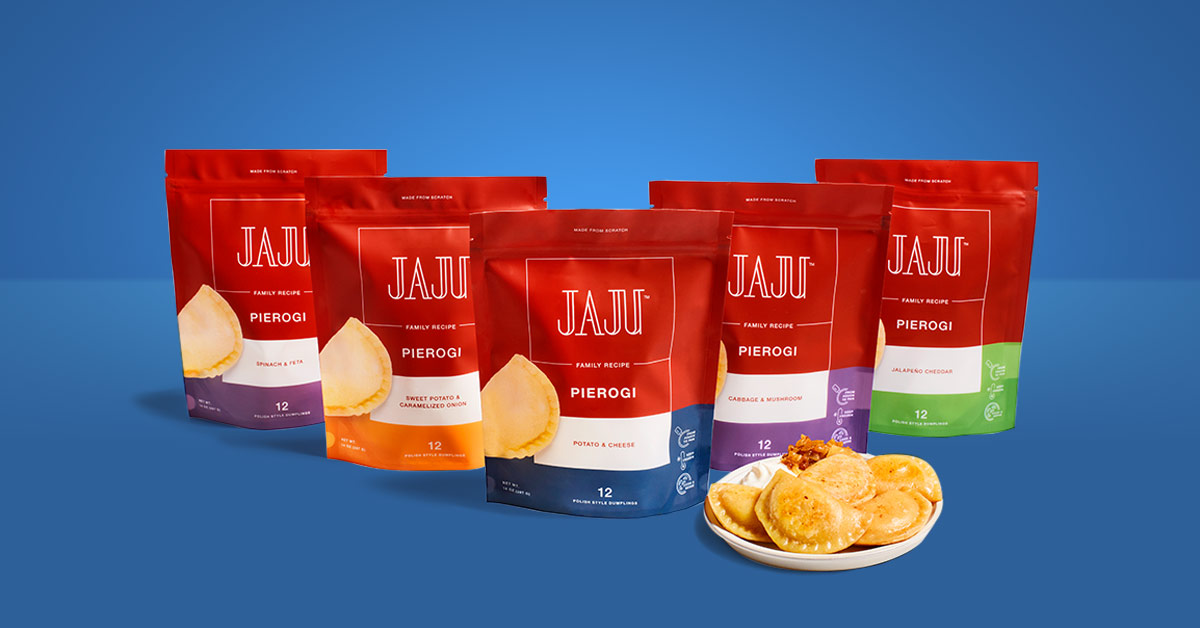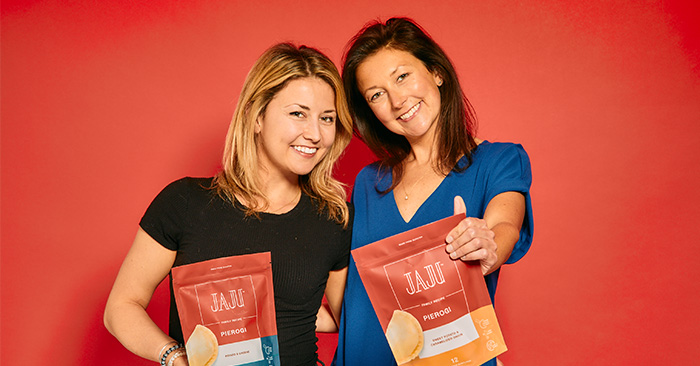Need Some Pierogi? Ask Your Polish Jaju

Familiarity with asian-style dumplings has increased in recent years but there are other ethnic varieties of the stuffed delicacy trying to replicate that success. Jaju Pierogi has been on a mission to bring a premium version of Poland’s favored dish to U.S. consumer freezers since 2016.
Founded by sisters Casey and Vanessa White, Boston-based Jaju has quietly and steadily grown an audience for its frozen pierogi based on their grandfather’s original recipes (“Jaju” is an Americanization of the Polish word for grandfather). Having raised its first outside investment via a $400,000 pre-seed round in late 2023, Jaju is leveraging its new resources to target expanded distribution in retail and foodservice, starting with entering Whole Foods stores nationwide this May.
For those not familiar, pierogi are traditional Polish dumplings usually made with a noodle or wheat-based dough (or skin) that are stuffed with cheese, meat, sauerkraut and/or potatoes. Pierogi are usually boiled and then lightly fried in butter when prepared.
The Slow Build Of A Distribution Network
Like many early-stage brands, Jaju was “super grassroots to start” and is now shedding its startup brand identity to open new opportunities as a premium pierogi option, Vanessa White said.
Over the course of its seven years, the brand has developed six pierogi varieties: Potato & Cheese, Cabbage & Mushroom, Sweet Potato & Caramelized Onion, Spinach & Feta, Jalapeño Cheddar, and Kielbasa & Red Pepper.
Over the summer, the brand got into the LEAP accelerator program which led to Jaju locking in distribution at Whole Foods New England stores. Currently, it is in around 2,000 doors in 45 states with about 800 of those coming last year with distribution in Stop and Shop, Big Y and nationwide in Sprouts.
But the growth came at a cost: Similar to many growing brands that don’t have broker representation, Jaju didn’t negotiate its free fill program when it launched in one of its biggest wholesale accounts and found itself in the red.
“So that backfired and I learned a very hard lesson,” Casey White said. “Most of 2023 we were really just paying our bills and trying to hang on.”
Positioned as a premium product fetching $14 per 12-count bag online and retailing in-store for over $10, Jaju is trying to build a brand similar to what Graza has done for olive oil, Vanessa said, “building a brand that customers love to engage with, laugh with, tell their friends about, and share online.”
Relying on cold-chain distribution and finding shelf space in the freezer aisle is no small feat for a startup food brand carving out a niche as a premium European-style dumpling.
Jaju ended up taking an investment in December as it began to scale its footprint into new markets. The pre-seed round garnered two-$200,000 tranches from investors who had not invested in CPG but were connected to Jaju’s co-packer.

What’s the plan for 2024? The brand was recently picked up by the National Co+op Grocers reset adding about 147 co-op stores across the country to its distribution network. Jaju also expects to go nationwide in Whole Foods come May putting its pierogi in more UNFI warehouses which the Whites hope will open other retail partnerships in new regions.
Jaju also plans to innovate into gluten-free and vegan varieties while eyeing Canada as a new market where there is a significant Polish and Ukrainian population.
“There are people who have nostalgic connections to pierogi everywhere,” Vanessa said. “But we’ve found specific success in areas where people from the Midwest and Northeast may have moved like Florida, the Carolinas and the Pacific Northwest.”
It might seem counterintuitive to not go deep in regions with large Polish or Eastern European communities like Pittsburgh or Chicago, White said. But Jaju has found that these locations already have established local, homemade pierogi makers or buy more affordable national brands like Mrs. T’s or Kasia’s. The company expects bigger markets like California and Texas where there are fewer options for artisanal European-style dumplings to offer new opportunities, White said.
While broadening its retail footprint, it is also trying to expand in foodservice. Currently, Jaju is carried by New England-based foodservice distributor Dole & Bailey but is hoping to line up more accounts with stadiums, arenas or college sports concessions where larger orders can be met without the expense of retail grocery distribution. Jaju is solidifying a 3PL partner so it can ease the shipping process and is developing a bulk 50-count pierogi bag this year to meet more foodservice customers.
Evolving With Production Demands
Over the course of its first four years in business, Jaju was a regional brand getting its start in farmers markets and working its way up to independent and regional New England grocery chains. The sisters primarily self-distributed and sold DTC which an especially challenging task with frozen product.
By 2018, the business had grown enough to move into its own production facility located in Lynn, Massachusetts with a focus on its wholesale business. But over the next two years, as demand increased and the company opened up new retail partnerships, self-manufacturing left little time for much else.
Just as the White sisters began talking about moving their production to a co-packer to focus on expanding the brand’s retail footprint out of the Northeast, the pandemic changed everything. Retail and D2C sales skyrocketed.
“We went from making maybe 15,000 to 20,000 pierogi a week [pre-pandemic] to making 40,000 over the course of four days because we had to,” Vanessa White said. “It was just a crazy time for us.”
With increased demand and scale of production elevated, so did efficiency but the sisters still “needed more time and space to build the business,” Vanessa White said.
What began as a six-month plan in October 2022 to slowly move production to a co-packer, quickly escalated to all production being outsourced by the beginning of 2023.
Now with more working capital, Jaju plans to invest in marketing like Instacart ads and digital coupon services as well as working with retailers to educate a broader customer base through sampling, demos and more social media campaigns.
“Getting pierogi in mouths,” Vanessa White said. “I want Jaju Pierogi to be an experience.”

















